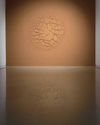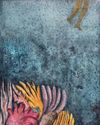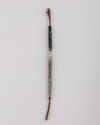
From three-dimensional fetish objects to tactile sculptures of female goddesses and fabric paintings predicting the end of time, several contemporary artists are using fabric, cloth and fibre in diverse art practices. It’s high time therefore that the conversation around textile and fibre art moves beyond rigid categories like art and craft, domestic and public realms, feminine and masculine impulses, and instead focus on form, concept, aesthetics, gesture and fate. In order to do this, we must admit our mistakes – our biases that led to the writing of dominant, largely male art histories. In the marginalization of the feminine, the queer, the economically and socially disadvantaged people, a large part of our history has got erased and fallen short of depicting the simultaneity, the depth and the nuances of complex expressive practices.
While this may take many years to annotate, correct and fix, we must constantly remind ourselves of what was overlooked. Since we talk about textiles we must also talk about the problem of conflating craft and domesticity. Textile and fibre art have long been dismissed as feminine, domestic and decorative modes. This prejudice was most acute towards women, who had, over decades, developed challenging conceptual practices across a variety of contexts, materials and techniques. Most of fibre and textile art are inflected by gender (and colonial) experiences. Practices of labour, affects of waiting and care, accidents of tear and recuperative customs of repair are pre-inscribed in the medium. In its firmness and fluidity, fall and folds, is a potent historical plane, charged with material from the past and ideas that are contemporary. Embedded here is a record of evolution and disagreement, a forging of new languages and vocabularies.
This story is from the {{IssueName}} edition of {{MagazineName}}.
Start your 7-day Magzter GOLD free trial to access thousands of curated premium stories, and 9,000+ magazines and newspapers.
Already a subscriber ? Sign In
This story is from the {{IssueName}} edition of {{MagazineName}}.
Start your 7-day Magzter GOLD free trial to access thousands of curated premium stories, and 9,000+ magazines and newspapers.
Already a subscriber? Sign In

Parts, Wholes And The Spaces In Between
Sonal Sundararajan introduces Samira Rathod's free-spirited and rebellious explorations in the world of architecture, furniture and design.

"The Fine Art of Going to the Pictures."
Dr. Banerjee in Dr. Kulkarni's Nursing Home at Chemould Prescott Road brings together 26 paintings featuring a series of dramatic scenes from Hindi and Bengali films. In conversation with Abhay Sardesai, artist Atul Dodiya talks about childhood trips to movie halls, painted figures gripped by tension, and the closeness and remoteness of cinematic images.

"To Finally Have Something of Your Own to Mine."
Dayanita Singh is the recipient of the coveted 2022 Hasselblad Award. Keeping the photograph at the centre, she speaks to Shreevatsa Nevatia about books, book objects, photo novels, exhibitions and museums.

OF DIVINE LOSS
Shaurya Kumar explores the relationship between the subject and object of devotion, finds Aranya.

THE PAST AND ITS SHADOWS
Neha Mitra visits two shows and three artists in Mumbai.

FORCE OF NATURE
Alwar Balasubramaniam dwells on absences and ephemeralities in his new work, states Meera Menezes.

SHAPES OF WATER
Devika Sundar's works delineate the murky, malleable boundaries between the human body and the organic world, says Joshua Muyiwa.

INTIMATIONS OF INTIMACY
Sunil Gupta shares his journey with Gautami Reddy.

THE FRACTURED PROSPECT
Nocturnal landscapes as ruins in the making? Adwait Singh looks at Biraaj Dodiya's scenes of loss.

TEETERING BEYOND OUR GRASP
Meera Menezes traces Mahesh Baliga's journey from Moodabidri to London.